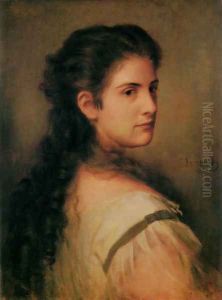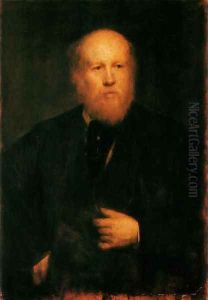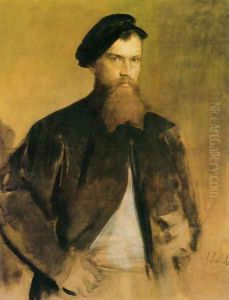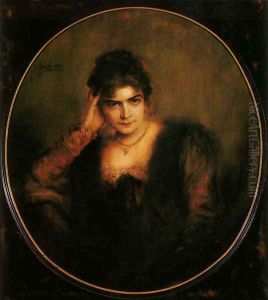Lenbach Franz Von Paintings
Franz von Lenbach, born Franz Seraph Lenbach on December 13, 1836, in Schrobenhausen, Bavaria, was a prominent German portrait painter and central figure in Munich's art scene during the late 19th century. He was later ennobled by Prince Regent Luitpold of Bavaria, which allowed him to add 'von' to his name, signifying his elevated social status.
Lenbach showed early artistic talent and began his formal training at the Augsburg Academy before moving on to study at the Academy of Fine Arts Munich. He also spent time in Antwerp and Paris, where he was influenced by the works of Old Masters like Rubens and Rembrandt, as well as by contemporary artists such as Gustave Courbet and Édouard Manet. However, his most formative experience came during his stay in Rome, where he was deeply impressed by the Renaissance masters.
Throughout his career, von Lenbach was most renowned for his portraits, which were highly sought after by the European aristocracy, notable intellectuals, and wealthy bourgeoisie. His style combined a mastery of technique with a certain psychological depth that captured the personalities and moods of his subjects. He was particularly skillful in his use of color and lighting, often using rich, warm tones to create dramatic effects.
Von Lenbach's portraits of famous contemporaries, such as Otto von Bismarck and Pope Leo XIII, solidified his reputation as one of the era's foremost portraitists. He was also a shrewd businessman and understood the power of social connections in the art world. His approach to art was often seen as a blend of realism and idealism, which allowed his subjects to be presented in the most favorable light while maintaining a strong resemblance to their actual appearance.
Franz von Lenbach's influence extended beyond his own work; he was a mentor to younger artists and played a significant role in the Munich Secession, a movement that sought to break away from the traditional academic art of the time. Despite his association with the avant-garde, von Lenbach's own painting style remained relatively conservative throughout his life.
Franz von Lenbach died on May 6, 1904, in Munich. His legacy is preserved not only through his portraits but also through the Lenbachhaus, a gallery and museum in Munich that was once his residence and studio. The museum houses many of his works as well as pieces from other artists of the Munich School, ensuring that von Lenbach's impact on German art history continues to be recognized and appreciated.



